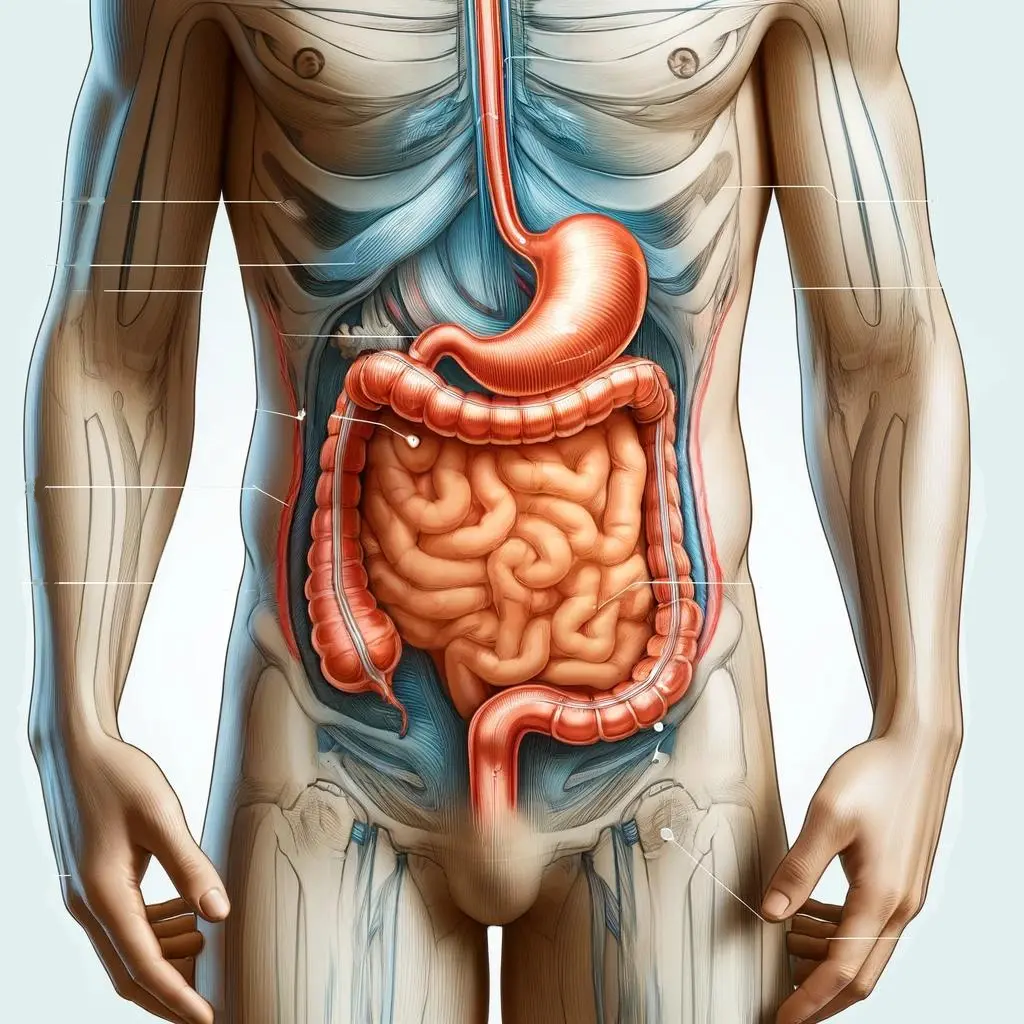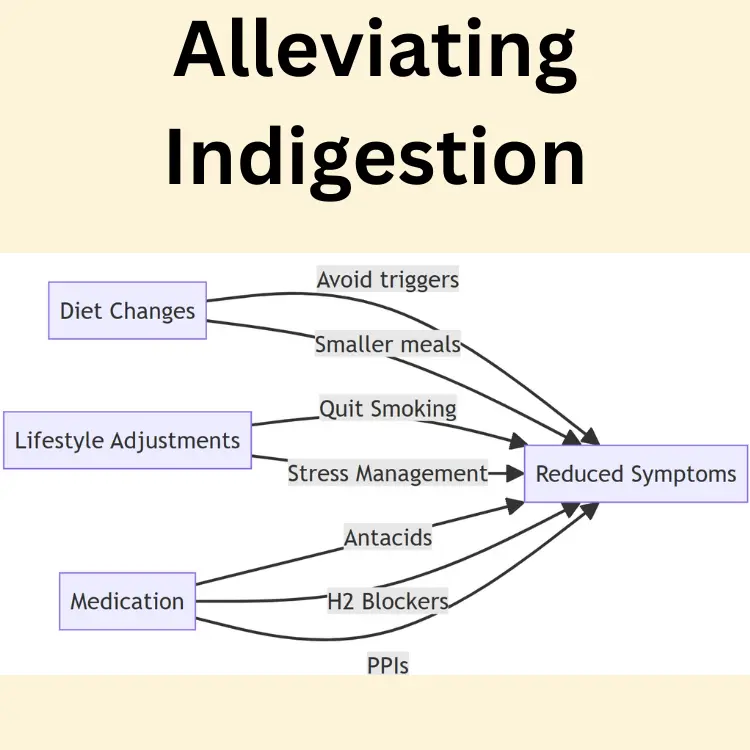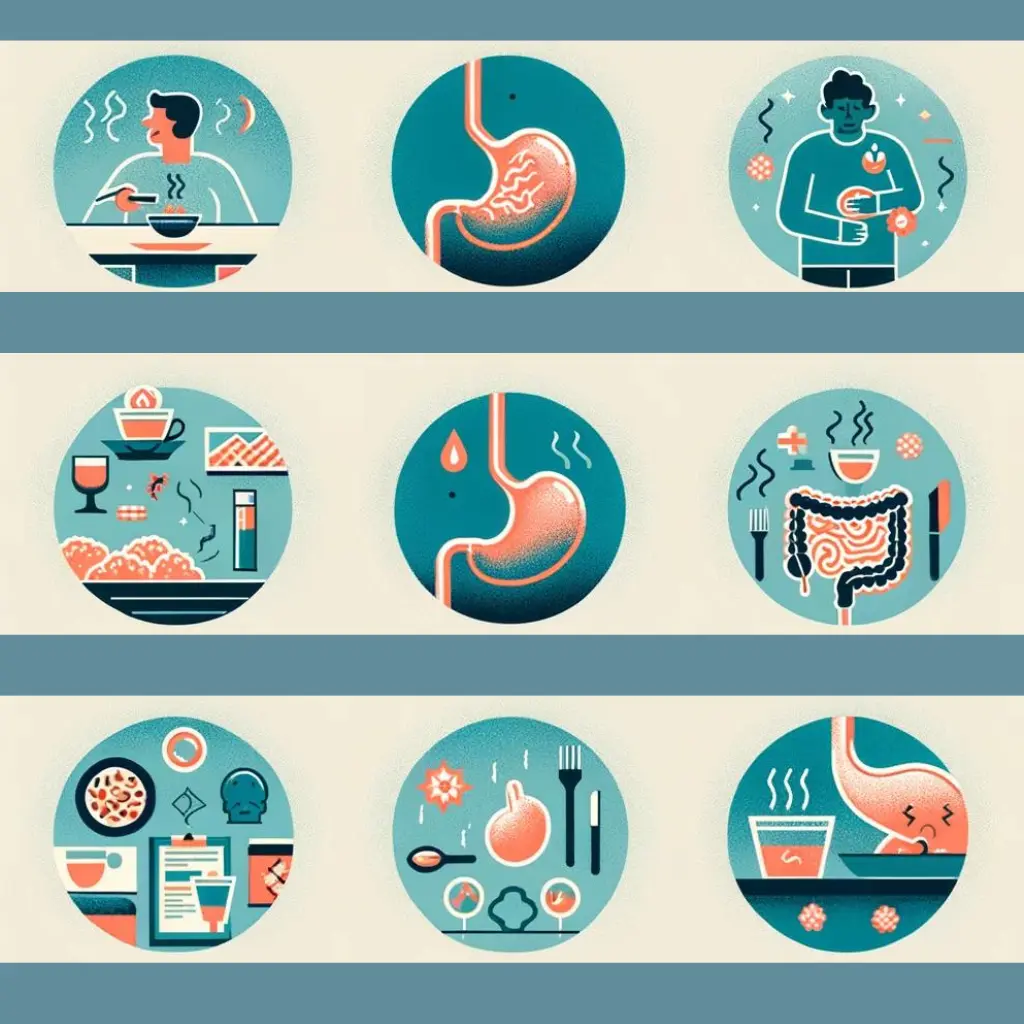- An Introduction to the Infamous Indigestion
- What is Indigestion?
- Potential Causes of Indigestion
- Managing and Treating Indigestion
- Distinguishing Between Constipation, Indigestion, and Gas: Causes, Symptoms, and Overlaps
- Conclusion to Understanding Indigestion
- Frequently Asked Questions About Digestive Issues
- What are the common causes of indigestion?
- How can I tell the difference between indigestion and heartburn?
- What are the best home remedies for gas and bloating?
- Why do I get constipated and how can I prevent it?
- Can lifestyle changes improve my digestive health?
- When should I see a doctor for digestive problems?
- What dietary adjustments can help manage indigestion?
- Is it possible to confuse symptoms of IBS with other digestive issues?
- Additional Resources for Understanding and Managing Digestive Health
- Frequently Asked Questions About Digestive Issues
An Introduction to the Infamous Indigestion
Indigestion, often characterized by discomfort or pain in the upper abdomen, is a common ailment that affects many individuals across various lifestyles. Medically referred to as dyspepsia, indigestion encompasses a variety of gastrointestinal symptoms which can disrupt a person’s daily life. In this detailed guide, we will delve into the symptoms, causes, and effective treatments for indigestion, aiming to provide actionable advice for those seeking relief.
What is Indigestion?
Indigestion is not a disease; rather, it is a set of symptoms related to the digestive system that includes abdominal pain and a feeling of fullness soon after beginning to eat. Unlike heartburn, which is related to the esophagus, indigestion is concerned with discomfort in the stomach.

Symptoms of Indigestion
People experiencing indigestion may report the following symptoms:
- Early Fullness During Meals: Feeling overly full despite having eaten a small amount of food.
- Persistent Abdominal Discomfort: Mild to severe pain in the area between the breastbone and the navel.
- Burning Sensation in the Upper Abdomen: An uncomfortable heat or burning feeling below the breastbone.
- Bloating: An unpleasant tight feeling in the stomach area.
- Nausea: Frequent feelings of wanting to vomit.
Less common symptoms include vomiting, belching, and occasionally, heartburn.
When to Consult a Doctor
While occasional indigestion is not a cause for concern, persistent or severe symptoms warrant medical attention. It is advisable to see a healthcare provider if you experience:
- Discomfort lasting more than two weeks.
- Severe pain, especially if accompanied by other symptoms such as weight loss, vomiting of blood, or difficulty swallowing.
- Symptoms like shortness of breath, sweating, or pain that spreads to the jaw, neck, or arm.

Potential Causes of Indigestion
Indigestion can be triggered by a variety of factors, often related to lifestyle choices:
- Dietary Habits: Overeating, consuming high-fat or spicy foods, caffeine, alcohol, and carbonated drinks can provoke indigestion.
- Smoking and Anxiety: Both can interfere with the digestive process and exacerbate symptoms.
- Medications: Certain drugs, including anti-inflammatories and antibiotics, may irritate the stomach lining.
Some health conditions also pose a risk for developing indigestion, such as:
- Gastritis
- Peptic Ulcers
- Celiac Disease
- Gallstones
- Pancreatitis
- Stomach Cancer
Understanding the Causes of Indigestion: From Foods to Disorders
Indigestion can be triggered by various factors ranging from diet to underlying medical conditions:
- Dietary Triggers: Consuming fatty, greasy, or spicy foods as well as overeating are common causes of indigestion. Foods high in caffeine and alcoholic beverages can also exacerbate symptoms.
- Lifestyle Factors: Smoking and high stress or anxiety levels can negatively impact the digestive system, leading to indigestion. Managing these factors through lifestyle changes can help alleviate symptoms.
- Medical Conditions: Several disorders can be at the root of indigestion, including peptic ulcers, gastroesophageal reflux disease (GERD), and more serious conditions like stomach cancer. Conditions such as diabetes and thyroid disease might also cause digestive issues.
- Medications: Certain medications, especially non-steroidal anti-inflammatory drugs (NSAIDs) like aspirin and ibuprofen, can irritate the stomach lining and cause indigestion.
Understanding these causes is crucial for diagnosing and treating indigestion effectively. It’s important to consult a healthcare professional if you experience persistent or severe symptoms to rule out any serious underlying conditions.

Managing and Treating Indigestion
Treatment for indigestion involves a combination of lifestyle changes and medication based on the underlying cause. Here are some effective strategies:
Lifestyle Modifications
- Eating Habits: Eat smaller, more frequent meals and chew your food slowly and thoroughly.
- Avoid Trigger Foods: Stay away from foods known to cause discomfort.
- Reduce Alcohol and Caffeine: Limit your intake of alcohol and caffeine, and avoid them if they trigger symptoms.
- Quit Smoking: Smoking can exacerbate indigestion; quitting helps reduce symptoms.
- Manage Stress: Anxiety can impact digestion, so techniques like meditation, yoga, or counseling can be beneficial.
Medications
- Antacids: Help neutralize stomach acid and can provide quick relief.
- H2 Receptor Antagonists: Reduce stomach acid production and are typically used for heartburn.
- Proton Pump Inhibitors (PPIs): Significantly reduce stomach acid production, helping heal the stomach lining.
Alternative Therapies
- Herbal Remedies: Peppermint, ginger, and slippery elm are known for their digestive benefits.
- Acupuncture: Some studies suggest acupuncture can be effective in treating symptoms of indigestion.
How to Treat Indigestion Effectively
Managing indigestion involves a combination of lifestyle changes, over-the-counter medications, and home remedies that can alleviate symptoms. Here’s how you can implement these strategies:
- Lifestyle Modifications: Fundamental changes include eating smaller, more frequent meals to avoid overloading the stomach, and ensuring you chew food slowly to aid digestion. Avoiding late-night meals and waiting a couple of hours before lying down can also prevent symptoms.
- Medications: Over-the-counter remedies such as antacids (e.g., Tums, Rolaids), H2 receptor antagonists (e.g., Ranitidine), and proton pump inhibitors (e.g., Omeprazole) are effective for reducing stomach acid and providing relief from indigestion.
- Home Remedies: Ingredients like baking soda can neutralize stomach acid quickly, providing temporary relief from symptoms such as bloating and abdominal pain. Additionally, incorporating ginger, oatmeal, and non-citrus fruits into your diet can improve digestion and prevent indigestion.
- Herbal and Alternative Therapies: Herbal supplements like peppermint, caraway oils, and the Japanese herbal formula Rikkunshito can be used to treat indigestion symptoms, although their effectiveness may vary. Acupuncture and psychological treatments such as hypnotherapy have also been found beneficial for some individuals.
These treatments can be incorporated into your daily routine or used as needed to manage symptoms, providing a comprehensive approach to dealing with indigestion.

Distinguishing Between Constipation, Indigestion, and Gas: Causes, Symptoms, and Overlaps
Understanding the differences between constipation, indigestion, and gas can help in managing these common digestive issues more effectively. While these conditions may share some symptoms, their causes and treatments can differ significantly.
Constipation
Causes: Constipation typically arises when stool moves too slowly through the colon, leading to excessive water absorption that makes the stool hard and difficult to pass. This can be due to inadequate fluid intake, low dietary fiber, insufficient physical activity, and ignoring the urge to pass stool. Certain medications such as opioid pain relievers and some antihypertensives, as well as medical conditions like diabetes and hypothyroidism, can also cause constipation.
Symptoms: Common symptoms include fewer than three bowel movements per week, hard or lumpy stools, straining during bowel movements, and a feeling that not all stool has been passed. Constipation can also lead to complications like hemorrhoids and anal fissures.
Indigestion
Causes: Indigestion, or dyspepsia, is often related to lifestyle factors such as overeating, consumption of fatty or spicy foods, and high levels of stress. It may also be triggered by smoking, alcohol, and certain medications like antibiotics and pain relievers. Medical conditions such as gastritis, peptic ulcers, and gallstones can also lead to indigestion.
Symptoms: The primary symptoms include pain or discomfort in the upper abdomen, a feeling of fullness during or after a meal, and possibly nausea or bloating. Unlike heartburn, which involves a burning sensation in the chest, indigestion affects the upper abdomen.
Gas
Causes: Gas in the digestive tract is primarily caused by swallowing air (aerophagia) and the breakdown of certain foods by bacteria in the colon. Foods that often cause gas include legumes, certain vegetables, fruits, and whole grains. Conditions like food intolerances (e.g., lactose intolerance) and chronic intestinal diseases (e.g., Crohn’s disease) can also lead to gas.
Symptoms: Symptoms include burping, passing gas, abdominal bloating, and pain or cramps in the abdomen. The presence of excessive gas can also aggravate feelings of indigestion and constipation.
Overlaps and Interactions
- Constipation and Gas: Constipation can often exacerbate gas symptoms, as delayed transit of stool provides more time for fermentation and gas production in the colon.
- Indigestion and Constipation: These two conditions may overlap when delayed gastric emptying or impaired intestinal motility is involved. Constipation can sometimes manifest as part of the spectrum of symptoms in functional dyspepsia.
- Indigestion and Gas: Indigestion can lead to gas, especially when associated with specific foods that increase bloating and gas production. Conversely, excessive gas might be mistaken for indigestion due to similar symptoms like bloating and abdominal discomfort.
In managing any of these conditions, a comprehensive approach involving dietary adjustments, lifestyle changes, and possibly medications is often effective. Identifying and treating any underlying medical conditions is also crucial. For persistent or severe symptoms, consulting with a healthcare provider is recommended to rule out more serious underlying issues and to obtain a tailored treatment plan.
For further details, you can visit sources like the Mayo Clinic on gas and Merck Manuals on constipation.

Conclusion to Understanding Indigestion
Indigestion is a common condition characterized by a variety of symptoms that can impact the quality of life. Through careful dietary management, lifestyle changes, and appropriate medical treatment, many individuals find significant relief from indigestion. It is important to consult healthcare professionals if symptoms persist or worsen, to rule out more serious underlying conditions. Remember, managing indigestion is not only about treating symptoms but also adopting a healthier lifestyle that prevents discomfort from occurring in the first place.
By understanding the causes and treatments of indigestion, as well as implementing suggested lifestyle adjustments, individuals can greatly improve their digestive health and
Frequently Asked Questions About Digestive Issues
What are the common causes of indigestion?
Indigestion can be triggered by eating too fast, overeating, or consuming foods that are fatty, spicy, or too acidic. Lifestyle factors such as stress, smoking, and excessive alcohol intake can also contribute, as well as medications like NSAIDs and steroids, and medical conditions including gastritis, peptic ulcers, and gallstones.
How can I tell the difference between indigestion and heartburn?
Indigestion and heartburn are often confused because they both involve the upper digestive tract. However, indigestion is primarily felt as a full, uncomfortable sensation in the stomach along with nausea and bloating, whereas heartburn is a burning sensation that rises from the stomach to the esophagus in the chest.
What are the best home remedies for gas and bloating?
Effective home remedies for gas include dietary adjustments such as increasing intake of water and fiber, and reducing high-fiber food consumption if you notice an increase in gas. Additionally, physical activities can help move gas through the intestines. Over-the-counter products like simethicone can also relieve gas and are found in brands like Gas-X.
Why do I get constipated and how can I prevent it?
Constipation occurs when bowel movements become less frequent, and stools become difficult to pass. It can be caused by poor diet, lack of exercise, dehydration, or medication side effects. Preventing constipation involves eating a high-fiber diet, drinking plenty of water, exercising regularly, and not ignoring the urge to go to the bathroom.
Can lifestyle changes improve my digestive health?
Yes, lifestyle changes can significantly improve digestive health. Recommendations include maintaining a balanced diet rich in fruits, vegetables, and whole grains, staying hydrated, exercising regularly, reducing alcohol intake, and managing stress through activities like yoga or meditation.
When should I see a doctor for digestive problems?
You should consult a healthcare provider if you experience symptoms that are frequent, severe, or worsening, such as significant abdominal pain, changes in bowel habits, unexplained weight loss, or blood in the stool. These symptoms could indicate a more serious underlying condition that requires medical evaluation.
What dietary adjustments can help manage indigestion?
To manage indigestion, it is recommended to eat smaller, more frequent meals, avoid trigger foods (such as fatty and spicy foods), and consume meals slowly. Limiting or avoiding caffeine, alcohol, and chocolate can also help, as these can irritate the stomach lining and exacerbate symptoms.
Is it possible to confuse symptoms of IBS with other digestive issues?
Yes, irritable bowel syndrome (IBS) can often be confused with other digestive issues like indigestion or constipation as it shares many symptoms such as stomach pain, bloating, and changes in bowel habits. Distinguishing IBS from other digestive problems typically involves noting symptom patterns, triggers, and response to dietary changes or stress management.
These FAQs are designed to address common concerns and provide practical advice for managing digestive health effectively. For more in-depth information or personalized advice, consulting with a healthcare professional is always recommended.
Additional Resources for Understanding and Managing Digestive Health
Navigating the complexities of digestive issues such as constipation, indigestion, and gas can be challenging. To further enhance your understanding and provide more comprehensive care options, below is a list of resources covering the causes, symptoms, treatment, and management of these conditions.
General Digestive Health
- Mayo Clinic – Digestive Disorders: Provides an extensive overview of symptoms, causes, and treatments for various digestive disorders including indigestion, constipation, and gas.
- Merck Manuals – Consumer Version: Offers detailed medical information on a wide range of health topics, including digestive health issues.
Constipation
- National Institute of Diabetes and Digestive and Kidney Diseases (NIDDK): Features comprehensive guides on symptoms, causes, prevention, and treatments for constipation.
- Gastroenterological Society of Australia (GESA): Provides patient-friendly information and clinical updates on gastrointestinal health, including constipation.
Indigestion
- International Foundation for Gastrointestinal Disorders: Offers insights into the management and treatment of indigestion, including diet and lifestyle tips.
- Healthline – Digestive Health: Includes easy-to-understand information on indigestion symptoms, causes, and effective home remedies.
Gas
- American College of Gastroenterology: Provides educational material on causes and treatments for excessive gas.
- WebMD – Gas and Bloating: Offers practical advice on managing and preventing gas and bloating.
Lifestyle Modifications
- Harvard Health Publishing: Discusses how lifestyle choices impact digestive health and ways to modify habits for improved digestive function.
- Cleveland Clinic – Healthy Living: Provides a series of articles and tips on maintaining a healthy digestive system through diet and exercise.
These resources offer a broad spectrum of information from symptom identification and daily management to understanding the deeper medical implications of digestive disorders. They can be incredibly valuable for anyone looking to deepen their knowledge or find effective treatments for their symptoms.
- Mastering the Mortgage Process: The #1 Guide to Home Buying
- Exploring Healthy Fast-Food in 2024: The Surprising Truth
- The Sesame Care Advantage: Revolutionizing Healthcare Access
- Healthcare Assistance for Low-Income Families in the U.S.
- Ultimate Guide to Assistance Programs in the U.S.: Federal, National, and State-Specific Support















